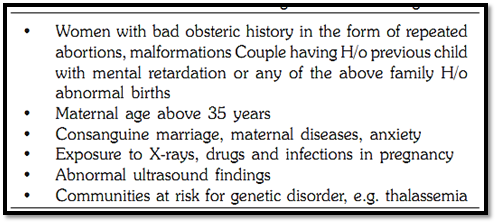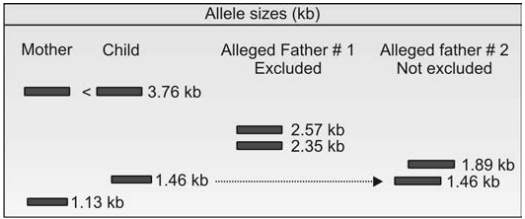


 النبات
النبات
 الحيوان
الحيوان
 الأحياء المجهرية
الأحياء المجهرية
 علم الأمراض
علم الأمراض
 التقانة الإحيائية
التقانة الإحيائية
 التقنية الحيوية المكروبية
التقنية الحيوية المكروبية
 التقنية الحياتية النانوية
التقنية الحياتية النانوية
 علم الأجنة
علم الأجنة
 الأحياء الجزيئي
الأحياء الجزيئي
 علم وظائف الأعضاء
علم وظائف الأعضاء
 الغدد
الغدد
 المضادات الحيوية
المضادات الحيوية|
Read More
Date: 11-11-2015
Date: 11-11-2015
Date: 11-11-2015
|
Genetic Counseling
INTRODUCTION
Genetic counseling is an important step in the process of genetic consultation. It is the step, which offers various options available to an individual or the family of an individual affected with a genetic disorder. Counseling is also required at every step in a diagnostic procedure and thus may require several specialists under one roof. For example, in a prenatal diagnostic procedure one requires a counsellor to give an overall idea of the procedure involved till the final results are obtained, and follow-up advice further on the basis of the results obtained. The obstetrician involved in the procedure should counsel before sampling is done. An expert in cytomolecular or biochemical genetics is consulted to interpret the results and a paediatric surgeon may be required if postnatal surgery is planned.
Any couple with a child or a family member with a genetic problem or a history of congenital defect will be keen to know more about the disorder, the risk of recurrence of the disorder, and remedial measures if any (Table.1). The aim of the genetic counsellor is to provide these individuals seeking information with an understanding of the disease in question and its implications, as well as the options available. A good counseling process helps families with their problems, allows informed decision-making, reduces possible anguish and is a step towards the final adjustment in dealing with the disorder.
Accurate diagnosis is of paramount importance for meaningful genetic counseling and counseling needs to include all aspects of the condition.
Table 1: Indications for genetic counseling

Who needs genetic counseling?
People who seek genetic counseling often have the following questions: (1) Do they have any type of genetic disease and or are they carriers (2) Do they run the risk of having another child affected with the particular genetic disease (3) what are the implications of the genetic disease already diagnosed as existing in one or both parents who are planning parenthood, and what is the prognosis and treatment (4) Referral to the appropriate source if they are seeking artificial insemination by donor or adoption (5) What kind of help is available for their already affected child and where they can find it.
What is genetic counseling?
The American College of Medical Genetics defines genetic counseling as a communication process, which deals with the human problem associated with occurrence or risk of occurrence of a genetic disorder in a family. This process involves an attempt by one or more appropriate trained persons to help the individual or the family to:
1- Comprehend the medical facts, including the diagnosis, probable course of the disorder and available management.
2- Appreciate the way heredity contributes to disorders and the risk of recurrence in specified relatives.
3- Understand the options for dealing with the risk of recurrence.
4- Choose the course of action, which seems appropriate to them in view of their risk and their family goals, and act in accordance with that decision.
5- Make the possible adjustment to the disorder in affected members and /or to the risk of recurrence of the disorder. The counsellor should keep all the facts and the available options in front of the patients and let them choose the path.
Stages in communication processes
Five stages can be identified in this communication process:
History Taking and Pedigree Construction
The affected individual who seeks advice is called the PROBAND. Often the proband is a child but he or she may also be interviewed along with relatives. A standard medical history is required for the proband and for any other affected persons in the family. Next, the pedigree is constructed with standardized symbols. Pedigree construction gives a clue to the possible mode of inheritance.
Clinical Examination and Diagnosis
A complete physical examination of the proband is essential. At times it may be necessary to seek an opinion from an expert in a related specialty to confirm the clinical diagnosis. In conditions like mental retardation or hearing impairment where predisposing factors could be purely genetic, or genetic and environmental, a history and clinical examination, and further investigations may be needed. A variety of investigations may be required reflecting the various types of genetic disorders. Occasionally the affected individuals will be otherwise unavailable for assessment and an attempt should be made to obtain hospital or other records, which might aid definitive diagnosis. Both parents should be counselled and all aspects of the condition must be clearly and thoroughly explained.
RECURRENCE RISK ESTIMATION
Counseling in genetic disorders that follows a Mendelian pattern is straight forward, however patient or parents need to understand this. For example, a risk of 1 in 4 may be misunderstood as to when one affected child is present parent’s may consider future pregnancies safe. The risk of occurrence of 1 in 4 for every pregnancy should be clearly explained.
Counseling is very often sought in a pregnancy, where information about the affected child is incomplete. In chromosomal disorders prenatal diagnosis can be made successfully without a confirmed laboratory diagnosis of an index case. For example, if a pediatrician has made a confirmed clinical diagnosis, foetal tissue sampling such as amniocentesis or chorion villous biopsy for chromosomal studies can be undertaken. However, in case of a biochemical disorder, precise laboratory diagnosis in an index case as well as carrier status of the parents needs to be established. A similar situation arises in some conditions where molecular diagnosis is required. For example, in a recessive disorder such as thalassemia mutation analysis can be applied in the absence of an affected child, however, the carrier status of the couple has to be initially confirmed by mutation analysis. However, in an X-linked disorder such as Duchenne muscular dystrophy unless mutation in the index case is confirmed, no carrier detection test or prenatal diagnostic test in the mother can be planned.
Directive and non-Directive counseling
Patients seeking counseling should be given as accurate information as possible about the disease and all possible options. They should be left to choose a path. Genetic counseling offered to a patient should always be non-directive. Patients often will ask the counsellor what he or she would do if they were in a similar situation. Giving an opinion in this matter is a form of directive counseling which should always be avoided.
In the United Kingdom under congenital disabilities act of 1976, legal action can be taken against a person whose breach of duty to the parents, results in a child being born disabled, abnormal or unhealthy. Failure to give correct advice by the consultant for the risk of fetal abnormality in a future pregnancy and possibility of prenatal diagnosis may constitute medical negligence.
Problems in genetic counseling
Genetic Heterogeneity
Counseling is difficult in cases where disease has genetic heterogeneity. Genetic heterogeneity is seen in conditions like Charcot-Marie-Tooth disease or retinitis pigmentosa, which can be inherited as an autosomal dominant, autosomal recessive or X-linked recessive disorder. However, with molecular diagnostic tests for these disorders it has become possible to diagnose and therefore provide counseling for these disorders. Consanguinity
Most marriages are non-consanguinous, however in certain Indian communities marriages between blood relatives is a custom. Mortality and morbidity may be higher in conceptions occurring from consanguinous marriages due to the increased chances of inherited a recessive trait that manifests in disease. Incidence of congenital malformations, hearing deficiency and mental retardation may be higher. If the family history is otherwise negative, the risk of major congenital malformation is 5% as compared with the 3% general population risk, and the added risk of autosomal recessive conditions is 1%.
ADOPTION AND GENETIC DISORDER
Parents who are at high risk for a genetic disorder in their offspring often consider adoption as an option. The geneticist may be called upon in such a situation to find out the risk of genetic disease in the child to be adopted. If no family history or obstetric history of the mother is available, routine karyotyping and metabolic screening for certain disorders may be carried out. However, the possibility of an untested genetic disorder can never be ruled out.
Paternity testing
A geneticist may be consulted to opine in issues of paternity. Until recently, disputed paternity was tested using a series of polymorphic blood groups and enzymes. If a child possesses a blood group or other polymorphic gene which is absent in both the partners, paternity can be possibly excluded. For example if both the partners lack blood group B but it is present in the child the putative father can be possibly excluded. If a child lacked a marker, which could have come from putative father, again paternity is possibly excluded. For example, a father with a blood group AB will not have a child with group 0. However, paternity in these cases can be excluded in 95% of cases but could never be proven. Testing for paternity has now been transformed by the use of DNA fingerprinting. The probes used identify multiple dispersed sequences of variable size called VNTRs (variable number of tandem repeats). The pattern produced is characteristic for an individual. A child’s fragment pattern is a combination of some of the fragments from each parent and a putative father can be either excluded or positively identified (Fig. 1). DNA fingerprinting can also be used for forensic testing of DNA from semen or dried blood spots.

Fig. 1: Paternity testing
References
Purandarey, H. (2009). Essentials of Human Genetics. Second Edition. Jaypee Brothers Medical Publishers (P) Ltd.



|
|
|
|
اكتشاف تأثير صحي مزدوج لتلوث الهواء على البالغين في منتصف العمر
|
|
|
|
|
|
|
زهور برية شائعة لتر ميم الأعصاب التالفة
|
|
|
|
|
|
موكب أهالي كربلاء يستذكر شهادة الإمام الصادق (عليه السلام)
|
|
|
|
العتبة العباسية تستذكر شهادة الإمام الصادق (عليه السلام) بإقامة مجلس عزاء
|
|
|
|
أهالي كربلاء يحيون ذكرى شهادة الإمام الصادق (عليه السلام) في مدينة الكاظمية
|
|
|
|
شعبة مدارس الكفيل النسوية تعقد اجتماعًا تحضيريًّا لوضع الأسئلة الامتحانية
|